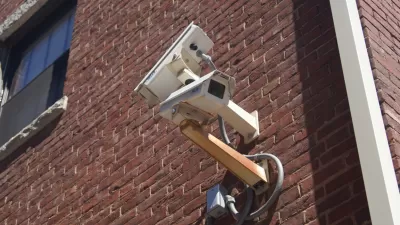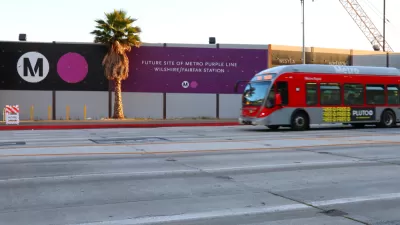Across the globe, smart cities are increasingly procuring and implementing information technology in order to improve the efficiency and sustainability of urban spaces. The former CTO of L.A. and the mayor of Beverly Hills weigh in on the subject.

In March, New Orleans debated a controversial public safety plan which the American Civil Liberties Union has condemned as “surveillance on steroids." As cities attempt to capture more data and implement communication technologies with the aim of making lives and resource consumption more sustainable and efficient, the issue of privacy and trusting government agencies continues to grow in importance. In an exclusive The Planning Report interview, former city of Los Angeles Chief Technology Officer and GE Executive Peter Marx, and former Beverly Hills Mayor Allan Alexander discuss the potential impacts of surveillance on the Southern California region.
In the context of surveillance, many cities monitor citizens through strategically placed sensors around the urban landscape, which collect data. From these sensors, data is transmitted, aggregated, and analyzed by governments and other local authorities in order to extrapolate information about the challenges the city faces in sectors such as crime prevention, traffic management, energy use and waste reduction.
The constant and omnipresent collection and transmission from disparate sources into a single government entity has led to concerns being raised that these systems turning into ‘electronic panopticons’ where governments exploit data driven technologies in order to maximize effective surveillance of their citizens. As French philosopher Michel Foucault revitalized interest in the panopticon as being at the receiving end of asymmetrical surveillance, Foucault wrote in 1975 about citizens in what has become today's electronic panopticon: “He is seen, but he does not see; he is an object of information, never a subject in communication.” Today, the implications are far-reaching as communities of color and low-income communities combat increased surveillance with additional histories of government abuses.
Marx, who has spent time all over the world learning about information technologies, was quick to distinguish the aims of U.S. entities versus other international actors. Marx noted that in more authoritarian countries, surveillance of the public "is being used for political control. In Western China, they use data not only from cameras, but also from facial recognition, mobile devices, automobile tags, body scans, and even DNA in order to create a complete database of everybody who’s in China and what their activities are. The purpose of this is quite clear: public safety, yes, but also maintaining the power of the state."
Alexander, who was mayor of Beverly Hills in the early 1990s, oversaw the original decision to install CCTV cameras in public spaces in the business districts (such as the famous Rodeo Drive). Residents of Beverly Hills pushed back on the thought of doing any residential surveillance, but were supportive of installing cameras and information technologies in the business areas. As Alexander, also a well-regarded attorney, put it: "Like in London and Monaco, Beverly Hills residents came to the conclusion that the security benefits of the cameras in the business areas outweighed their concern with privacy." At the time, Alexander also made it clear that he wanted cameras to be exposed and visible, so as to be a crime deterrent.
One new technology—automated license plate readers—have recently experienced some pushback from cities like Culver City and Davis. Although Alexander was not mayor of Beverly Hills at the time, Beverly Hills has had the readers in place for more than five years. Alexander noted that although other cities have rejected the technology because of the data liability, there are benefits from being an additional deterrent to crime or increase the ability to stop a suspect in a car that has been identified by readers as stolen.
On the question of public concern about personal privacy, Marx provided some historical perspective of how much people now accept the collection of data. Marx noted that, "if you told somebody 15 years ago, for example, that you were going to index their emails, they would have said, “That’s really creepy.” On the other hand, everyone using Gmail today has their emails indexed for the purposes of advertising." Marx did highlight the growing concern of surveilling private space, such as houses and hotel rooms. "The concept of a smart home," Marx noted, "is fundamentally about putting sensors around your house in order to do things automatically. By definition, it’s about collecting data in your home and understanding and acting on patterns in that data. For whatever reason, the home is considered a reasonable place for the private sector to collect data; you don’t see a lot of outrage about it."
Both Marx and Alexander noted the importance of reducing costs in providing cameras and information-capturing technologies. For municipal governments—especially cities without the finances of places like Beverly Hills—costs have prohibited the adoption of more camera technologies. Now, Marx explains, "there is an open-source software kit out there so that you can actually make your own license-plate reader for less than $25. Or you can go onto Amazon and buy a pack of five battery-operated cameras for a few hundred dollars, connect them to your house and to the cloud, and watch them from your iPhone. This is incredibly powerful, in a way that was unimaginable 10 years ago." The decrease in costs means that more cities will be deciding about their surveillance strategies in the coming months.
Ultimately, Marx concluded that for all cities and citizens: "We have to collectively decide, society by society, how much we want to tolerate."
FULL STORY: Surveillance in Cities: Peter Marx & Allan Alexander Opine

Planetizen Federal Action Tracker
A weekly monitor of how Trump’s orders and actions are impacting planners and planning in America.

Map: Where Senate Republicans Want to Sell Your Public Lands
For public land advocates, the Senate Republicans’ proposal to sell millions of acres of public land in the West is “the biggest fight of their careers.”

Restaurant Patios Were a Pandemic Win — Why Were They so Hard to Keep?
Social distancing requirements and changes in travel patterns prompted cities to pilot new uses for street and sidewalk space. Then it got complicated.

Albuquerque Route 66 Motels Become Affordable Housing
A $4 million city fund is incentivizing developers to breathe new life into derelict midcentury motels.

DC Area County Eliminates Bus Fares
Montgomery County joins a growing trend of making transit free.

Platform Pilsner: Vancouver Transit Agency Releases... a Beer?
TransLink will receive a portion of every sale of the four-pack.
Urban Design for Planners 1: Software Tools
This six-course series explores essential urban design concepts using open source software and equips planners with the tools they need to participate fully in the urban design process.
Planning for Universal Design
Learn the tools for implementing Universal Design in planning regulations.
Heyer Gruel & Associates PA
JM Goldson LLC
Custer County Colorado
City of Camden Redevelopment Agency
City of Astoria
Transportation Research & Education Center (TREC) at Portland State University
Camden Redevelopment Agency
City of Claremont
Municipality of Princeton (NJ)





























